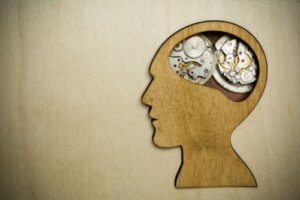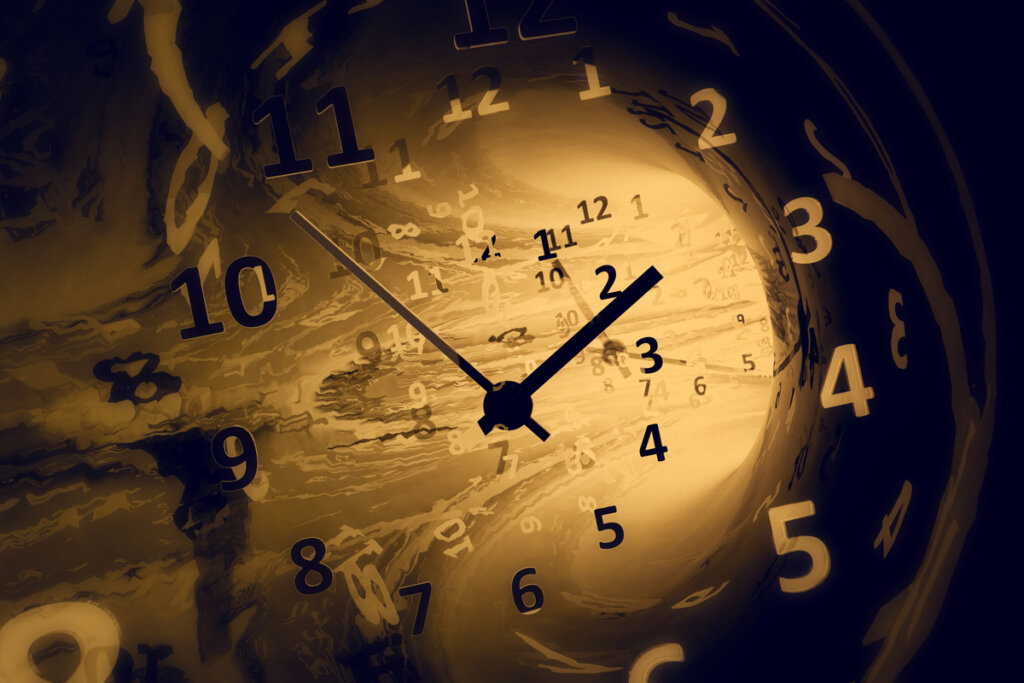The Social Zeitgeber Theory


Written and verified by the psychologist Valeria Sabater
Your physical and psychological well-being is built through good habits. For this reason, implementing certain routines will make it easier for your mind and body to structure time and its basic psychobiological processes.
Your brain needs you to go to bed at the same time every night. Furthermore, it requires that you always eat at the same time, and even that you have scheduled moments of relaxation. Moreover, healthy and regular routines reduce the risk of suffering from mood disorders, such as depression or anxiety.
This explains why a structured life favors the care of your circadian rhythms. It allows you to better adapt to moments of light and darkness, favoring the harmony of all the physiological and hormonal processes that optimize your well-being. However, sometimes, external factors can appear that completely alter the harmony of your internal clock.
Psychological balance isn’t only based on biological elements. In fact, what happens in your environment, or the ‘social zeitgebers’, lie behind many depressive disorders.
Until not long ago, it was taken for granted that bipolar disorder was caused by certain biological alterations. Today, the social zeitgeber theory is seen as more relevant.

The social zeitgeber theory
Social zeitgeber theory suggests that negative and unpredictable life experiences disrupt the body’s circadian rhythms. This relationship can cause mental health problems.
The University of Pittsburgh (USA) published a study describing this approach. It highlighted how any changes in our social rhythms affect our biological clocks, making us more vulnerable to depression.
This interesting concept was first coined in the 1960s by the physician, Jürgen Aschoff. He was one of the founders of chronobiology. A zeitgeber is an element that synchronizes our circadian processes, such as sunlight. In addition to these natural factors, there are social zeitgebers. For example, losing a job or not having a well-structured routine.
Much of the research around this theory has focused on bipolar disorder. For a long time, it was assumed that this condition stemmed from neurobiological triggers.
However, we now know that approaches such as social rhythm therapy, aimed at taking care of social zeitgebers, manage to stabilize the moods of these patients.
A zeitbeger that completely modulates biological rhythms is sunlight. A social zeitbeger, such as life habits or relationships, also affects circadian processes.
When the social sphere alters the biological
We know that mood disorders, such as depression, respond to a complex range of factors. They range from genetic to educational and experiential triggers. Also important is the fact that some people are more vulnerable than others when it comes to suffering from mental health problems.
The theory of social zeitgeber has been recognized for years. It suggests that certain adverse events occur in the environment capable of modifying our circadian rhythms. This leads to emotional disturbances. In effect, the social modifies the biological. This is frequently exhibited in various realities:
- Having a fight or disagreement with someone.
- Losing a job.
- Having a job with really long and unbalanced shifts.
- Living in a stressful environment.
- Having a life with no clear routines.
These types of circumstances end up affecting our eating and rest habits. What’s more, these triggers can cause us to stop adjusting our lives to the cycles of light and darkness. This not only affects our physical health but also our mental health.

Adjust your routines to adjust your internal biological clock
Your internal biological clock or circadian rhythm doesn’t only depend on your exposure to sunlight during certain hours of the day. In fact, your lifestyle can completely alter it and lead to circadian rhythm disorders.
Research conducted by Northwestern University, Illinois (USA) states that a disturbed circadian rhythm leads to cognitive impairment, mood disorders, and cardiometabolic disorders. The social zeitgeber theory suggests that a regulated, structured lifestyle with healthy social habits reduces the risk of anxiety or depression.
Patients with bipolar disorder can also better manage their symptoms by taking care of these factors.
Social rhythm therapy
Interpersonal and Social Rhythm Therapy (IPSRT) was developed by Dr. Ellen Frank in the 1990s to regulate mood through tighter biological and social routines.
The idea is to control the zeitgebers that alter our well-being. Ideally, it means creating and developing new routines that take care of our internal clocks. Here are some strategies if you want to give it a try:
- Improve your night rest and eating habits.
- Manage your time correctly.
- Employ strategies to regulate your feelings of stress.
- Improve your social skills to better handle interpersonal problems.
- Improve your schedule by establishing set times for relaxation and sports.
In conclusion, having a routine, in many cases, means having a healthy life. Especially if it allows you to adjust the sources that cause your emotional alterations and help you stay in harmony with your sleep-wake/light-dark cycles. Give it a try.
Your physical and psychological well-being is built through good habits. For this reason, implementing certain routines will make it easier for your mind and body to structure time and its basic psychobiological processes.
Your brain needs you to go to bed at the same time every night. Furthermore, it requires that you always eat at the same time, and even that you have scheduled moments of relaxation. Moreover, healthy and regular routines reduce the risk of suffering from mood disorders, such as depression or anxiety.
This explains why a structured life favors the care of your circadian rhythms. It allows you to better adapt to moments of light and darkness, favoring the harmony of all the physiological and hormonal processes that optimize your well-being. However, sometimes, external factors can appear that completely alter the harmony of your internal clock.
Psychological balance isn’t only based on biological elements. In fact, what happens in your environment, or the ‘social zeitgebers’, lie behind many depressive disorders.
Until not long ago, it was taken for granted that bipolar disorder was caused by certain biological alterations. Today, the social zeitgeber theory is seen as more relevant.

The social zeitgeber theory
Social zeitgeber theory suggests that negative and unpredictable life experiences disrupt the body’s circadian rhythms. This relationship can cause mental health problems.
The University of Pittsburgh (USA) published a study describing this approach. It highlighted how any changes in our social rhythms affect our biological clocks, making us more vulnerable to depression.
This interesting concept was first coined in the 1960s by the physician, Jürgen Aschoff. He was one of the founders of chronobiology. A zeitgeber is an element that synchronizes our circadian processes, such as sunlight. In addition to these natural factors, there are social zeitgebers. For example, losing a job or not having a well-structured routine.
Much of the research around this theory has focused on bipolar disorder. For a long time, it was assumed that this condition stemmed from neurobiological triggers.
However, we now know that approaches such as social rhythm therapy, aimed at taking care of social zeitgebers, manage to stabilize the moods of these patients.
A zeitbeger that completely modulates biological rhythms is sunlight. A social zeitbeger, such as life habits or relationships, also affects circadian processes.
When the social sphere alters the biological
We know that mood disorders, such as depression, respond to a complex range of factors. They range from genetic to educational and experiential triggers. Also important is the fact that some people are more vulnerable than others when it comes to suffering from mental health problems.
The theory of social zeitgeber has been recognized for years. It suggests that certain adverse events occur in the environment capable of modifying our circadian rhythms. This leads to emotional disturbances. In effect, the social modifies the biological. This is frequently exhibited in various realities:
- Having a fight or disagreement with someone.
- Losing a job.
- Having a job with really long and unbalanced shifts.
- Living in a stressful environment.
- Having a life with no clear routines.
These types of circumstances end up affecting our eating and rest habits. What’s more, these triggers can cause us to stop adjusting our lives to the cycles of light and darkness. This not only affects our physical health but also our mental health.

Adjust your routines to adjust your internal biological clock
Your internal biological clock or circadian rhythm doesn’t only depend on your exposure to sunlight during certain hours of the day. In fact, your lifestyle can completely alter it and lead to circadian rhythm disorders.
Research conducted by Northwestern University, Illinois (USA) states that a disturbed circadian rhythm leads to cognitive impairment, mood disorders, and cardiometabolic disorders. The social zeitgeber theory suggests that a regulated, structured lifestyle with healthy social habits reduces the risk of anxiety or depression.
Patients with bipolar disorder can also better manage their symptoms by taking care of these factors.
Social rhythm therapy
Interpersonal and Social Rhythm Therapy (IPSRT) was developed by Dr. Ellen Frank in the 1990s to regulate mood through tighter biological and social routines.
The idea is to control the zeitgebers that alter our well-being. Ideally, it means creating and developing new routines that take care of our internal clocks. Here are some strategies if you want to give it a try:
- Improve your night rest and eating habits.
- Manage your time correctly.
- Employ strategies to regulate your feelings of stress.
- Improve your social skills to better handle interpersonal problems.
- Improve your schedule by establishing set times for relaxation and sports.
In conclusion, having a routine, in many cases, means having a healthy life. Especially if it allows you to adjust the sources that cause your emotional alterations and help you stay in harmony with your sleep-wake/light-dark cycles. Give it a try.
All cited sources were thoroughly reviewed by our team to ensure their quality, reliability, currency, and validity. The bibliography of this article was considered reliable and of academic or scientific accuracy.
- Cudney, L.E., Frey, B.N., Streiner, D.L. et al. Biological rhythms are independently associated with quality of life in bipolar disorder. Int J Bipolar Disord 4, 9 (2016). https://doi.org/10.1186/s40345-016-0050-8
- Grandin LD, Alloy LB, Abramson LY. The social zeitgeber theory, circadian rhythms, and mood disorders: review and evaluation. Clin Psychol Rev. 2006 Oct;26(6):679-94. doi: 10.1016/j.cpr.2006.07.001. Epub 2006 Aug 10. PMID: 16904251.
This text is provided for informational purposes only and does not replace consultation with a professional. If in doubt, consult your specialist.







